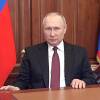President Joe Biden is warning business leaders and others of the potential for Russian cyberattacks amid the ongoing invasion in Ukraine, saying it's likely Russian President Vladimir Putin will retaliate against the United States.
Cybersecurity experts joined Greater Boston to share tips to protect yourself in the digital world and assess what a cyberattack could mean for the U.S. government.
Lauren Zabierek, executive director of the Cyber Project at Harvard Belfer Center, said a Russian cyberattack is a credible threat, adding that "we're all vulnerable in the digital realm."
More National News
For everyday citizens, she recommended good digital hygiene: using strong, randomized and different passwords across all personal accounts, implementing multi-factor authentication, regularly updating software and avoiding clicking on suspicious links or email messages, known as phishing, which is the top method of attack.
Michael Siegel, director of cybersecurity at the MIT Sloan School of Management, said that some people may want to create backup plans to access medication or other essentials that could be affected by an outage if infrastructure like electric grids is targeted.
"Preparing for cybersecurity is not just prevention and detection, it's also response. So even as individuals, we have to have a way to respond to some shortage, or something, that might occur," Siegel said.
Although he praised significant improvements that the government has implemented in the cybersecurity space, both experts said the capability for Russians to attack is very real.
"For [the] public, they hear 'attack' and they think, perhaps, 'act of war.' And that's not what we're talking about here," Zabierek said.
But the point at which a cyberattack becomes an act of war is still an unknown. Siegel posited a difference between the potential targeting of a few individual businesses, which could make front-page news, and attacks against systems that make up U.S. public infrastructure.
"If you start to cut off energy, electricity, so on and so forth, I think you start to cross a line, and that's when we don't know what happens," he said.
WATCH: What would a possible Russian cyberattack look like?







